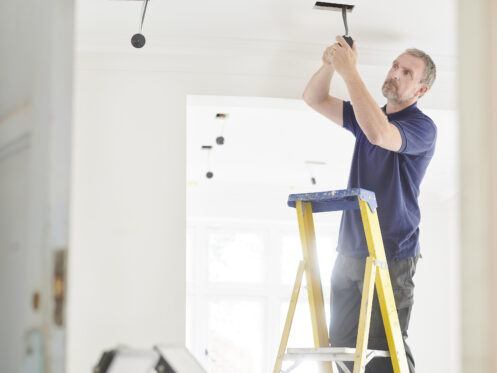Most homes rely on electricity for lighting and HVAC uses, and electrical issues related to these systems are common. As a homeowner, you may attempt DIY electrical work, especially if it is a minor problem. Many homeowners do DIY work because they believe they can save money on labor costs by doing the job themselves. However, some people don’t realize that mistakes made during the repair can cost much more than having a professional deal with the problem. Besides a time-consuming and expensive emergency room visit, homeowners risk causing issues with their electrical systems and costly repair visits down the road when they take on the work themselves. When you need electrical repairs or installation, leave the task to professionals. Here are nine reasons why.
1. Risk of Electrocution
The most common danger in DIY electrical work is electrical shock. It happens when you come into direct contact with live wires. You may assume it is easy to avoid this very real risk, but simple issues like improper insulation, faulty wiring, and a short lapse in attention can lead to electrocution. The human body is an excellent electrical conductor; once you contact the electricity, the current flows through your body and may disrupt normal physiological functions. An electrical shock may cause severe injuries like burns and, in extreme cases, can result in death. Electricians learn procedures that help them reduce the risk of electrocution during their work. Although watching them might give the suggestion it’s easy, without these procedures, the risk of electrocution is imminent.
2. Fire Hazards
Electrical issues contribute to approximately 51,000 house fires in the US every year. Most of these are due to heat generation within the electrical system. Improper wiring, overloaded circuits, or damaged electrical appliances can cause overheating. When this happens in hidden areas or around flammable substances, and a spark occurs, your house can catch fire.
Without the proper knowledge, you may use inadequate protection measures or incorrect procedures, such as overloading a circuit. Proper protection measures and methods help safeguard against electrical overloads, and their absence puts your home at risk for fire. DIY projects involving your electrical system create conditions for sparks due to things like improper installation and failure to use the correct components. Electricians thoroughly understand electrical codes and carefully plan circuits to prevent electrical fires.
3. Improper Wiring
There are specific codes about what kind of wire to use in your home for various applications to prevent safety hazards and ensure the electrical system does its job correctly. Choosing the wrong type of wire for a given project is easy. In addition, each wire type demands its own methods and components when making connections. Improper wiring occurs when you use the wrong wiring or do not use the proper parts. For example, you may use wires with inadequate insulation or fail to secure the connections correctly, leading to electrical problems. Improper wiring procedures may result in power outages or destroyed electronic gadgets. There is also the risk of getting electric shocks or having a fire outbreak.
4. Legal Issues
Texas requires an individual to have a permit before attempting any electrical repair in their home. In addition, the completed work must comply with the local building code. Compliance requires knowing and understanding the building codes in the first place. Most homeowners who attempt DIY work do not know about building codes related to electrical systems.
You will be legally responsible if an electric DIY project results in accidents or injuries and may face lawsuits and financial liabilities. When thinking about tackling an electrical issue on your own, consider the possibility of a future fire or electrocution leading to death. The consequences would be life-altering.
5. Unnecessary Costly Repairs or Replacements
The common thought before a homeowner attempts a DIY electrical work is saving money. Without proper knowledge, you may cause extensive damage to your electrical system or the appliances powered by it. You can make wiring, connections, or installation mistakes and cause electrical malfunction. Often, these issues are not immediately noticeable, but with time, they can escalate and lead to electrical system failure or damaged appliances needing replacement.
If your work causes severe problems with your entire electrical system, you will have to hire a professional electrician to identify and rectify the issue. You will incur additional costs to fix DIY mistakes. The cost to correct an error you made may be more than if you had hired a professional to perform the work in the first place.
6. Lack of Proper Tools and PPEs
An electrician has different tools and personal protective equipment (PPE) to keep safe during an electrical job. The unique gear may be as small as insulated gloves or safety goggles, but they add to their safety. Without them, the risk of personal injury increases.
Without the right tools, like a quality voltage meter, you may struggle to accurately and safely complete a task, increasing the chance of errors and hazards. Some homeowners have some of the necessary tools, but without proper knowledge of their use, the risk of hazards is still present.
7. Insurance Concerns
There is a risk your insurance company will not cover the costs when DIY electrical work results in damages. Damages from work done by non-professionals or electrical work that does not meet building codes are not covered. DIY electrical projects will fall under this category, and you will be responsible for all the repair work. The denial of coverage may not be for damages alone: injuries resulting from DIY projects may be deemed negligence, and the insurance may fail to cover the liability concerns.
8. Inadequate Grounding
DIY electrical work may overlook sufficient electrical system connection to the ground or incorrectly install grounding wires. Grounding provides a safe passage for the flow of excess electrical energy away from the house. In case of a fault or surge, the current is moved to the ground to reduce the possibility of shock, fires, or damage to the electronic equipment.
Inadequate grounding poses a considerable risk during events like a lightning strike. Lighting has high electrical energy, which may pass through conductive materials to the house. It can cause severe damage to electronic devices, appliances, and your electrical infrastructure.
9. Hidden Dangers
You may feel you know every corner of your home. However, there could be wiring in places you are not aware of. The possibility exists that aging electrical infrastructure or damage caused by rodents is the cause behind the issue you are trying to resolve. A professional will inspect your home before completing any electrical repairs. This examination allows them to identify hidden dangers before they perform the work. For instance, an electrician will detect threats like water damage infiltrating electrical elements or mistakes from previous DIY projects. Early detection can help a professional address electrical infrastructure issues before correcting the problem you called them for.
Contact the Professionals
At HR Phoenix, we are a family-owned business that has been serving the community of Colleyville, TX, and the surrounding area for years. We provide electrical and plumbing installation, repairs, and inspections for our residential and commercial customers. We can even rewire an older house or add an EV charging station to your home. Contact HR Phoenix today for all your electrical and plumbing service needs.


